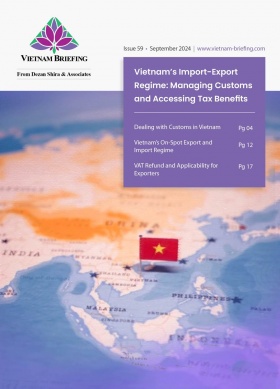Vietnam Proposes Major Government Restructuring to Streamline Bureaucracy
The Vietnam government is restructuring to ensure greater efficiency across its bureaucracy by reducing the number of ministries and agencies to 22 and addressing existing overlaps in public administration.
The Vietnamese government has unveiled a plan to restructure its organization, aiming to reduce the number of ministries and agencies to 22. This marks a significant effort to streamline governance, enhance operational efficiency, and align with modern administrative demands. The new structure will comprise 17 ministries and ministry-level agencies (down from 22) and five government-affiliated agencies (down from eight).
Also read: Implications for Businesses from Vietnam’s Government Restructuring
Vietnam government restructuring for greater efficiency
The restructuring proposal was discussed during the ninth meeting of the Government’s Steering Committee, chaired by Prime Minister Pham Minh Chinh on January 11. The meeting focused on implementing Resolution 18 of the 12th Central Committee, which seeks to reorganize and optimize the political system for maximum effectiveness. Discussions included draft reports, organizational recommendations, and plans to avoid any overlaps or gaps in responsibilities.
Prime Minister Chinh emphasized the importance of a seamless transition, stating that public services and government functions must continue uninterrupted. He highlighted the need to:
- Streamline personnel and enhance the quality of public officials.
- Maintain unity and cohesion within government bodies.
- Attract and retain top talent to strengthen public service delivery.
What are the major organizational changes proposed?
The proposed changes will result in significant structural adjustments, including mergers of several ministries and reassignments of responsibilities:
- The Ministry of Finance will absorb the Ministry of Planning and Investment.
- The Ministry of Home Affairs will integrate with the Ministry of Labor, Invalids, and Social Affairs.
- The Ministry of Construction will combine with the Ministry of Transport to form a consolidated entity.
- The Ministry of Science and Technology will incorporate functions from the Ministry of Information and Communications.
- The Ministry of Culture, Sports, and Tourism will take over press management responsibilities from the Ministry of Information and Communications.
- A new Ministry of Agriculture and Environment will merge the Ministry of Agriculture and Rural Development with the Ministry of Natural Resources and Environment.
- A newly created Ministry of Ethnic and Religious Affairs will handle functions previously managed by the Committee for Ethnic Minority Affairs and the Ministry of Home Affairs.
Ministries retaining their structures
Certain ministries will remain unchanged, including the Ministry of National Defense, Ministry of Public Security, Ministry of Justice, Ministry of Industry and Trade, Ministry of Foreign Affairs, Ministry of Education and Training, and Ministry of Health.
Key ministry-level agencies, such as the Government Office, Government Inspectorate, and State Bank of Vietnam, will also maintain their current structures.
Focus on internal reductions
To further enhance efficiency, Prime Minister Chinh directed ministries and agencies not undergoing mergers to reduce their internal divisions by at least 15–20 percent. Merged entities will face a higher reduction target of 35–40 percent. The aim is to reduce the number of public staff receiving salaries from the state budget by at least 20 percent. This objective is part of a plan to reorganize and streamline the structure of ministries, departments, branches, and localities in line with the implementation roadmap outlined in Decree No. 178/2024/ND-CP.
The Ministry of Defense and the Ministry of Public Security have already achieved key objectives outlined in Politburo resolutions, with plans to further streamline local police units and strengthen national security capabilities.
Protecting the rights of affected public staff
The Government issued Decree No. 178/2024/ND-CP, dated December 31, 2024, outlining the policies and regulations for cadres, civil servants, public employees, workers, and armed forces regarding the organizational restructuring of the political system. This decree came into effect on January 1, 2025, with several key policies focusing on early retirement, resignation, talent retainment, as well as training and development.
Commitment to modernization
According to the 2023 Provincial Governance and Public Administration Performance Index (PAPI) Report, published by the United Nations Development Programme (UNDP) on April 2, 2024, Vietnam received a total score of 41.85 points. The areas in which Vietnam excelled the most in the 2023 PAPI include public service delivery and environmental governance, with control of corruption also being a notable strength.
However, the report highlighted several weaknesses in Vietnam’s public governance and administration. These included low participation at local levels, a lack of transparency, inadequate vertical accountability, cumbersome public administrative procedures, and limited e-governance. This result indicates that there is significant room for improvement in enhancing the performance of the country’s public sector.
Vietnam aims to create a more efficient and responsive political system by reducing administrative overlap and ensuring that organizational structures align with their functional responsibilities. The ongoing restructuring plan highlights the country’s commitment to modernizing governance while maintaining operational efficiency and quality of service for citizens and businesses.
In recent years, the country has intensified its efforts to implement e-government initiatives. According to the 2024 E-Government Development Index (EGDI) published by the United Nations, Vietnam is ranked 71st out of 193 UN member states, climbing 15 places since 2022. This marks the first time Vietnam has entered the Very High e-Government Development Index (VHEGDI) category, achieving its highest ranking since it began participating in the UN EGDI assessment in 2003.
Vietnam’s EGDI score for 2024 is 0.7709 points, placing it among the countries classified in the VHEGDI category, which includes 39.4 percent of the assessed nations. This score surpasses the global average EGDI index of 0.6382, the Asian regional average of 0.6990, and the Southeast Asian regional average of 0.6928.
Conclusion
Vietnam’s proposed government restructuring aims to enhance operational efficiency by reducing ministries and agencies to 22, reflecting a commitment to modernize governance. The plan, which includes merging several ministries and optimizing public service delivery, underscores the government’s focus on streamlining operations while ensuring uninterrupted public services.
As Vietnam moves forward with these changes, there is a clear opportunity to strengthen governance and improve public administration performance.
About Us
Vietnam Briefing is published by Asia Briefing, a subsidiary of Dezan Shira & Associates. We produce material for foreign investors throughout Asia, including ASEAN, China, and India. For editorial matters, contact us here and for a complimentary subscription to our products, please click here. For assistance with investments into Vietnam, please contact us at vietnam@dezshira.com or visit us at www.dezshira.com.
Dezan Shira & Associates assists foreign investors throughout Asia from offices across the world, including in Hanoi, Ho Chi Minh City, and Da Nang. We also maintain offices or have alliance partners assisting foreign investors in China, Hong Kong SAR, Dubai (UAE), Indonesia, Singapore, Philippines, Malaysia, Thailand, Bangladesh, Italy, Germany, the United States, and Australia.
- Previous Article An Introduction to Doing Business in Vietnam 2025 – New Publication Out Now
- Next Article Vietnam’s Economic Outlook for 2025: Push for Digitalization and Sustainability































